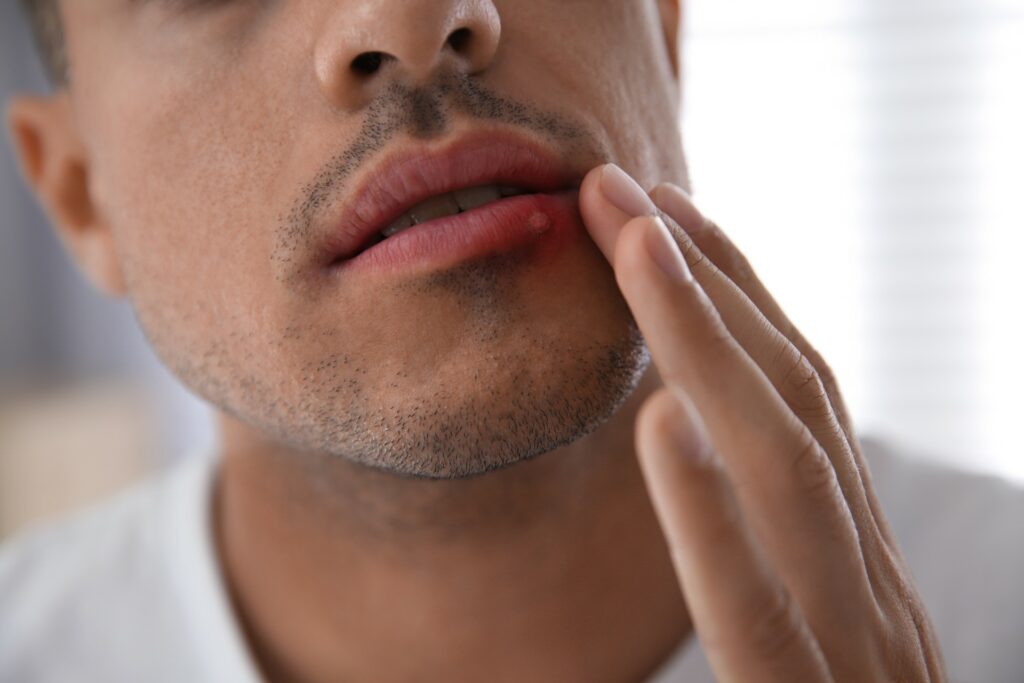Treating the Herpes Simplex Virus

Dermatologists are the best people to help diagnose and treat the herpes simplex virus correctly. When sores appear, regardless of where on the body, a professional and licensed dermatologist has the education, training, and experience to bring relief to those suffering from this discomfort. Sores on the face can make people self-conscious, and to help, there are affordable topical and oral treatments are available.
Outbreaks can be diagnosed by looking at the sores; in some cases, a swab can be taken and tested to confirm the virus. The herpes simplex virus has two strains. Herpes Simplex 1 mainly affects the face, whereas type 2 mainly affects genital skin. This common viral infection has localized blistering and is typically a reoccurring infection. In some cases, the first outbreak may be the only one that shows outward signs, and then the virus may lay dormant. There are triggers that may cause another outbreak, but as the body builds its defenses against the virus, adults often experience fewer and fewer outbreaks.
How Herpes Simplex Virus is Passed
The herpes simplex virus is easily passed by close contact between people, especially through kissing and unprotected intimate relations. Due to the virus’ highly contagious nature, touching open sores may spread the virus to other areas on an uninfected person. Washing hands frequently and not touching sores as they heal is highly recommended to avoid spreading the virus.
How Can Dermatologists Help Treat Herpes?
A licensed and caring dermatologist will help clients develop a manageable care plan, which may include topical treatments or oral prescription medication. A licensed dermatologist will handle the matter professionally, regardless of the location of the sores or the type of virus a person has. Sores will often clear on their own, but some can cause discomfort, and there are oral medications that minimize the symptoms and length of healing following an outbreak.
Herpes Simplex Type 1 (HSV-1)
HSV-1 is most often contracted when an individual is a child or infant, and often from their parent. Kissing, a pinch on the cheek, and sharing silverware are all ways the HSV-1 virus is known to spread. Once the virus is present in the body, it never goes away. In many cases, the virus becomes dormant, and those with the virus may never experience symptoms or an outbreak. There are known triggers that activate the virus. Those triggers include stress, sickness, high fevers, and overexposure to the sun’s harmful UV rays. What are commonly called cold sores most often appear on the face with HSV-1 but may appear anywhere on the body, such as the fingers and hands. The first outbreak is usually the worst, and as those with the virus get older, the body naturally forms antibodies to fight the virus, so those who may have taken a medication daily previously may find they only need to take them when they feel an outbreak coming on. The tingling sensation and blisters are indicators of an outbreak.
Herpes Simplex Type 2 (HSV-2)
Due to the way that HSV-2 is typically spread, many people are too embarrassed to share that they have the virus. The symptoms are the same, with painful sores but in the genital area. Suppose an individual is hesitating to see a dermatologist for help and relief. In that case, they shouldn’t – these licensed professionals handle many HSV cases and will work diligently to get the necessary care to the patient. It is estimated that approximately 20% of sexually active adults have the virus. A dermatologist can also do blood work to confirm if a patient has the virus, even with no outward signs.
What to Avoid During a Herpes Simplex Virus Outbreak
The main thing when suffering from sores is to let them heal and not do things to agitate them or spread them further. Avoiding acidic foods, exposure to the sun, and picking are the three best things a person can do during an outbreak. There are over-the-counter moisturizing medications that may provide some relief for mild sores. However, if you are suffering from multiple sores, only a prescription can provide quick relief and potentially prevent breakouts from occurring.
Although there is no cure for either Herpes Simplex virus, there is relief in treatments that a local dermatologist can easily provide. It is rare for there to be complications from carrying the virus in healthy adults. Newborns, babies, and those with weakened immune systems may require medical advice beyond the scope of dermatology. If you suffer from cold sores, HSV-1, or HSV-2, please contact Dr. Sherrie Straughn at Buckhead Dermatology. She is dedicated to skin health and has decades of experience helping patients get the relief they desire and deserve during HSV outbreaks. She is accepting new patients and has an extensive list of insurance providers her office accepts, allowing everyone to get the care they seek at an affordable cost.
